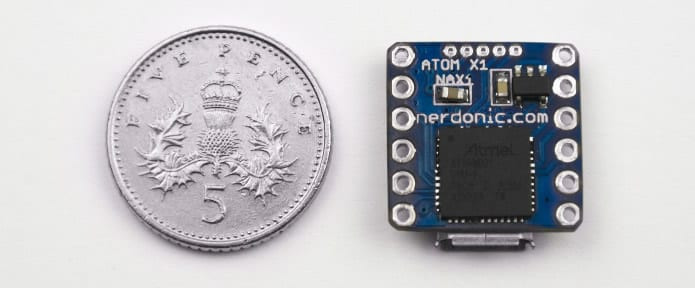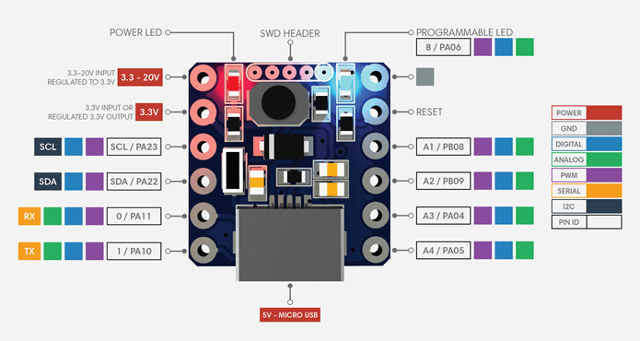Back in June, we reported about μduino board, which at 12×12 mm may well be the world’s smallest Arduino compatible board. It is based on Microchip Atmel ATMEGA32U4 8-bit AVR microcontroller.
But there’s now a new board in town which claims to be the world’s smallest 32-bit Arduino board: Exen Mini measuring 14.9×14.9 mm. While I’m patiently waiting for an Intel’s DMCA request, or more likely an email requesting an update once the name has changed, like I had to do for Atomwear Vigekwear, let’s have a look at what the board has to offer.
Exen Mini specifications:
- MCU – Microchip Atmel SAMD21 Cortex M0+ MCU @ 48 MHz with 256KB flash, 32KB SRAM
- I/Os via 2x 5-pin 2.54mm pitch headers
- Up to 8x digital I/O
- Up to 8x PWM
- Up to 6x analog (ADC)
- 1x UART
- 1x I2C
- 1x reset
- Limits – 3.7V, 7mA
- USB – 1x micro USB port
- Programming – via micro USB port or SWD header
- Misc – Power LED, user LED, button
- Power Supply
- 3.3-20V (regulated to 3.3v) via power Pin 1
- 3.3V via power pin 2
- 5V (regulated to 3.3v) via Micro USB port
- Current Draw Atom X1 = ~10mA
- Dimensions – 14.9 x 14.9 x 4.4mm
- Weight – 0.95 grams
The board is breadboard compatible, pre-flashed with Arduino Zero bootloader, and can be programmed in the Arduino IDE just like the original board.
Nerdonic, the company behind the project, is also working on both a slightly larger version of the board with 20 I/O pins, and and even smaller version using 1.27mm pitch headers. An ecosystem with modular shields/hats is also planned, but no details were provided.
The project has been launched on Indiegogo with a flexible goal. Early bird rewards start at 10 GBP (~$13.2 US) for the board with shipping adding 2 GBP to the UK, and 7 GBP to the rest of the world. In you’d like more than one, you can save on shipping by getting 5 or 10 boards packs. Delivery is scheduled for December 2017.
Via Time4EE

Jean-Luc started CNX Software in 2010 as a part-time endeavor, before quitting his job as a software engineering manager, and starting to write daily news, and reviews full time later in 2011.
Support CNX Software! Donate via cryptocurrencies, become a Patron on Patreon, or purchase goods on Amazon or Aliexpress








Wait, it lacks SPI pins….I personally don’t know what is the point of making it too small while sacrificing basic peripheral connectivity.
@Bumsik Kim
I think you could get the full SERCOM0 by using PA04 (PAD[0]) PA05 (PAD[1]) and PA10 (PAD[2]) PA11 (PAD[3]) which would get you a full SPI …
or you could run 4 uarts (and do nothing else.)
@Bumsik Kim
Don’t forget the native FS USB, which along with the small size more than makes up for missing SPI imho. Think of the tiny HID- or MIDI-class devices made possible, especially of the wearable variety.
Also consider the concept of “smart” peripherals, such as motor control of a drone, with a gyro and accelerometer on the I2C bus, movement/attitude commands and reports over serial (or FS USB), and the remaining four (or six) PWMs driving motors or servos. Or a galvanometer driver for mirrors for laser projection of images from RAM or ROM. Or a small, battery-powered six-channel data logger to I2C flash with USB mass-storage-class downloading.
The ST Sensortile is only13.5 by 13.5mm, slightly smaller.
@Brian
True, but it’s more like a module than a development board IMHO.
As expected Atom X1 board had to be renamed, and it’s now called Exen Mini.
The board is now sold on eBay for 10 GBP: https://www.ebay.co.uk/itm/183290650478
Exen Mini group buy for $11.30 @ https://groupgets.com/campaigns/443-exen-mini